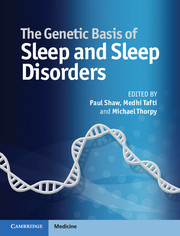Book contents
- The Genetic Basis of Sleep and Sleep Disorders
- The Genetic Basis of Sleep and Sleep Disorders
- Copyright page
- Contents
- Foreword
- Preface
- Contributors
- Abbreviations
- Section 1 Generalprinciples of genetics and genomics
- Section 2 Geneticsof sleep and circadian rhythms
- Section 3 Sleepphysiology and homeostasis
- Section 4 Insomnias
- Section 5 Narcolepsyand hypersomnias
- Section 6 Sleep-related breathing disorders
- Chapter 28 Linkage and candidate gene studies of obstructive sleep apnea
- Chapter 29 Genomic variants and genotype–phenotype interactions in pediatric sleep-related breathing disorders
- Section 7 Circadian rhythm sleep disorders
- Section 8 Parasomniasand sleep-related movement disorders
- Section 9 Psychiatricand medical disorders
- Section 10 Medication effects
- Index
Chapter 28 - Linkage and candidate gene studies of obstructive sleep apnea
from Section 6 - Sleep-related breathing disorders
Published online by Cambridge University Press: 05 November 2013
- The Genetic Basis of Sleep and Sleep Disorders
- The Genetic Basis of Sleep and Sleep Disorders
- Copyright page
- Contents
- Foreword
- Preface
- Contributors
- Abbreviations
- Section 1 Generalprinciples of genetics and genomics
- Section 2 Geneticsof sleep and circadian rhythms
- Section 3 Sleepphysiology and homeostasis
- Section 4 Insomnias
- Section 5 Narcolepsyand hypersomnias
- Section 6 Sleep-related breathing disorders
- Chapter 28 Linkage and candidate gene studies of obstructive sleep apnea
- Chapter 29 Genomic variants and genotype–phenotype interactions in pediatric sleep-related breathing disorders
- Section 7 Circadian rhythm sleep disorders
- Section 8 Parasomniasand sleep-related movement disorders
- Section 9 Psychiatricand medical disorders
- Section 10 Medication effects
- Index
Summary
Keywords
- Type
- Chapter
- Information
- The Genetic Basis of Sleep and Sleep Disorders , pp. 279 - 301Publisher: Cambridge University PressPrint publication year: 2013
- 1
- Cited by

